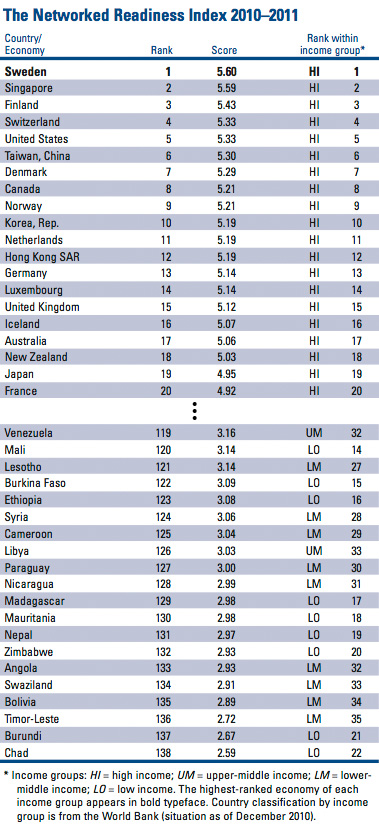This article is more than 1 year old
Forget China and India, Sweden is tech's superpower
Primed for take off
Sweden has, again, beaten all other countries at what the World Economic Forum describes as "fully integrating new technologies in...competitiveness strategies and using them as a crucial lever for long-term growth."
This ongoing Swedish success story is only one intriguing data point in the massive 10th annual Global Information Technology Report, published by the World Economic Forum in partnership with INSEAD – originally the Institut Européen d'Administration des Affaires.
The rankings are from the report's "Networked Readiness Index" (NRI), which is defined as "the capacity of countries to fully benefit from new technologies in their competitiveness strategies and their citizens’ daily lives."
Following Sweden among the top five countries in the NRI are Singapore, Finland, Switzerland, and the United States, in that order. The UK pulls in at number 15, with Japan lagging behind at a surprisingly low 19. China, the report says: "Consolidates its position at 36th after years of impressive progression in the rankings, while India loses some ground and is down five places at 48th." A total of 138 countries were ranked.

The top and bottom 20 countries in the Networked Readiness Index
The full report on worldwide information and communication technologies (ICT), which consists of 411 data- and opinion-packed pages, was released this week. Robert Greenhill, managing director and chief business officer of the World Economic Forum, said: "The pace of technological advance is accelerating and ICT is increasingly becoming a ubiquitous and intrinsic part of people’s behaviors and social networks as well as of business practices and government activities and service provision."
While that may sound like a typical "Well, duh..." broad-brush overview, the details in the report – including projection for the next decade – are far from simplistic. For example, country-by-country details are provided on such metrics as market, regulatory, and infrastructure environments; and individual, business and government "readiness" and ICT usage.
For example, the US is ranked number 52 in the quality of math and science education in one of the the individual readiness categories, and 45 in effectiveness of law-making bodies, part of the political and regulatory environment metrics. The UK is ranked 55 and 12, respectively, in those areas, and Singapore ranks number one in both.
Americans following the current congressional arguments about the effect or taxes on competitiveness might be interested to learn that although the US is ranked at a comparatively low 92 among 138 countries in total tax rate – meaning that 91 countries have lower overall rates – the report's number-one country, Sweden, scores significantly lower at 110. The UK, by the way, pulls in at a relatively comfortable ranking of 58 in this metric.
Interestingly, the UK scores noticeably better than the US when it comes to freedom of the press – 18 versus 38 – but the Nordic countries of Denmark, Sweden, and Norway handily win this metric, ranking one, two, and three, respectively. And if you're interested in a free press, we strongly suggest you avoid the bottom three: Iran, Libya, and the basement-dweller at 138, the train wreck that is Zimbabwe. ®
